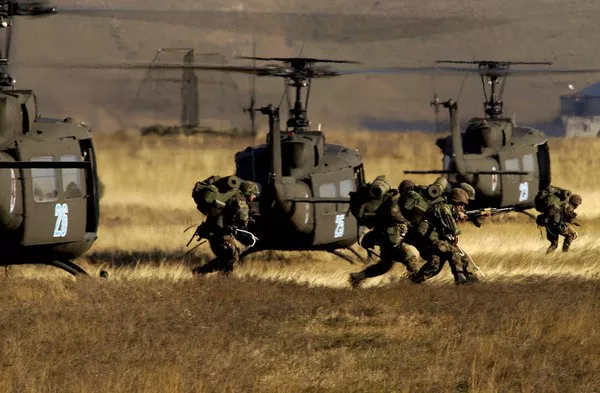In a world where geopolitical tensions and security concerns persist, nations allocate substantial resources to strengthen their defense capabilities. Military expenditures serve as a key indicator of a country’s commitment to national security and its readiness to address global challenges. In this article, we will delve into the 10 countries with the highest military expenditures, exploring the reasons behind their substantial investments in defense and the implications for international relations.
The 10 Countries with the Highest Military Expenditures
1. United States of America
Unsurprisingly, the United States consistently tops the list of countries with the highest military expenditures. As a global superpower, the U.S. maintains an extensive military presence worldwide. The defense budget, which includes funding for personnel, operations, research, and development, reflects the nation’s commitment to maintaining a technologically advanced and capable military force. The U.S. military plays a crucial role in addressing various global threats and safeguarding national interests.
2. China
In recent years, China has rapidly ascended as a major global player, and its military expenditures reflect this ascent. As the world’s most populous country and the second-largest economy, China has significantly increased its defense budget to modernize its armed forces. The country’s focus on enhancing capabilities in cyber warfare, naval power, and advanced weaponry underscores its ambitions to assert itself as a dominant force on the world stage.
3. India
India, with its complex geopolitical landscape and historical regional tensions, maintains a substantial defense budget. The country’s military expenditures are driven by the need to secure its borders, address internal security challenges, and respond to the evolving security environment in South Asia. India’s defense modernization efforts encompass investments in advanced technology, strategic capabilities, and a well-equipped personnel force.
4. Russia
As the successor to the Soviet Union, Russia remains a significant player in global politics. The country allocates a considerable portion of its budget to defense, emphasizing the modernization of its armed forces. Russia’s military expenditures focus on maintaining nuclear deterrence, strengthening its conventional forces, and expanding its influence in various strategic regions.
5. Saudi Arabia
Situated in a region marked by geopolitical instability, Saudi Arabia invests heavily in its military to ensure regional security. The country faces threats from various fronts, including regional conflicts and terrorism. Saudi Arabia’s defense expenditures prioritize advanced weaponry, intelligence capabilities, and collaborative defense initiatives with allied nations.
6. France
As a major European power and a permanent member of the United Nations Security Council, France maintains a robust military capable of responding to global security challenges. The country’s defense budget reflects its commitment to NATO and its role in various international peacekeeping missions. France emphasizes technological innovation, intelligence capabilities, and a versatile military force capable of rapid response.
7. United Kingdom
The United Kingdom, with its historical influence and strategic importance, continues to allocate significant resources to its defense budget. As a NATO member, the UK plays a crucial role in collective defense efforts. The country’s military expenditures focus on maintaining a credible nuclear deterrent, modernizing its armed forces, and participating in international security initiatives.
8. Germany
Germany, as an economic powerhouse in Europe, recognizes the importance of a robust defense capability. The country’s military expenditures aim to meet NATO commitments, enhance cybersecurity capabilities, and contribute to international peacekeeping efforts. Germany’s defense strategy aligns with its role as a key player in European security.
9. Japan
Japan, historically constrained by its post-World War II constitution, has recently increased its defense budget in response to regional security challenges. The country faces threats from North Korea and aims to bolster its defense capabilities, particularly in maritime and cyber domains. Japan’s military expenditures focus on enhancing its Self-Defense Forces and strengthening alliances with key partners.
10. South Korea
South Korea, situated in a region marked by geopolitical tensions, allocates a substantial portion of its budget to defense. The country faces ongoing security concerns related to North Korea and seeks to maintain a strong deterrent capability. South Korea’s defense expenditures prioritize modernizing its armed forces, enhancing cybersecurity, and collaborating with allies to ensure regional stability.
See Also: Top 10 Largest Economies In The World
Analysis of Key Trends
Understanding the reasons behind these countries’ high military expenditures involves examining key geopolitical, regional, and internal factors. Several common trends emerge, shedding light on the motivations driving substantial defense investments.
Regional Security Concerns
Many of the countries on the list face significant regional security challenges that directly impact their defense policies. The threat of conflict or instability in neighboring regions compels nations to maintain strong military capabilities as a deterrent and to respond effectively to potential threats.
Global Power Dynamics
The pursuit of global influence and power is a driving force behind the military expenditures of major players like the United States, China, and Russia. These countries aim to project strength on the international stage, asserting themselves as influential actors in geopolitical affairs.
Technological Advancements
Investments in advanced technology and modernizing military capabilities are common trends among countries with high defense budgets. Nations recognize the importance of staying at the forefront of technological innovation to maintain a strategic edge and effectively address evolving security challenges.
Alliance Commitments
Many countries on the list are active members of international alliances such as NATO. Alliance commitments play a crucial role in shaping defense policies, with member nations aligning their military capabilities to collective defense efforts and shared security objectives.
Internal Security Challenges
Several nations with high military expenditures face internal security challenges, including terrorism, insurgency, and border disputes. Addressing these internal threats requires robust defense capabilities, contributing to the overall defense budget.
Nuclear Deterrence
The possession and maintenance of nuclear weapons contribute significantly to the defense budgets of certain nations. Nuclear deterrence remains a key strategic consideration, influencing defense policies and resource allocations.
Implications for International Relations
The military expenditures of these 10 countries have far-reaching implications for international relations, shaping the global balance of power and influencing diplomatic dynamics. Understanding these implications is crucial for policymakers, analysts, and global citizens alike.
Strategic Alliances and Partnerships
Countries with high military expenditures often form strategic alliances and partnerships to enhance their collective defense capabilities. These alliances, such as NATO, strengthen the bonds between nations and contribute to a collaborative approach to addressing global security challenges.
Arms Race Dynamics
The pursuit of military superiority and the desire to maintain a technological edge can contribute to arms race dynamics among major powers. This competition for military dominance has the potential to escalate tensions and increase the risk of conflicts.
Global Stability and Security
While a strong defense is essential for national security, an excessive focus on military expenditures can divert resources from addressing pressing global issues such as poverty, climate change, and public health. Achieving a balance between defense priorities and global stability remains a challenge for the international community.
Diplomatic Influence
Countries with formidable military capabilities often wield significant diplomatic influence. The ability to project power and respond effectively to security challenges enhances a nation’s standing in international negotiations and geopolitical affairs.
Conflict Prevention and Resolution
Strategically allocated military expenditures can contribute to conflict prevention and resolution efforts. Nations with strong defense capabilities may play a pivotal role in peacekeeping missions, humanitarian interventions, and crisis management.
Economic Impact
High military expenditures can have economic ramifications, affecting a country’s fiscal health and resources available for social programs. Balancing defense priorities with economic sustainability is crucial for long-term stability and development.
Conclusion
The list of countries with the highest military expenditures provides valuable insights into the complex interplay of geopolitical, regional, and internal factors that influence defense policies. As nations navigate the evolving global landscape, understanding the motivations behind substantial defense investments is essential for fostering international cooperation, preventing conflicts, and promoting global stability. The challenge lies in finding a delicate balance between national security imperatives and addressing pressing global issues to ensure a harmonious and secure future for the world.
You Might Be Interested In:

























